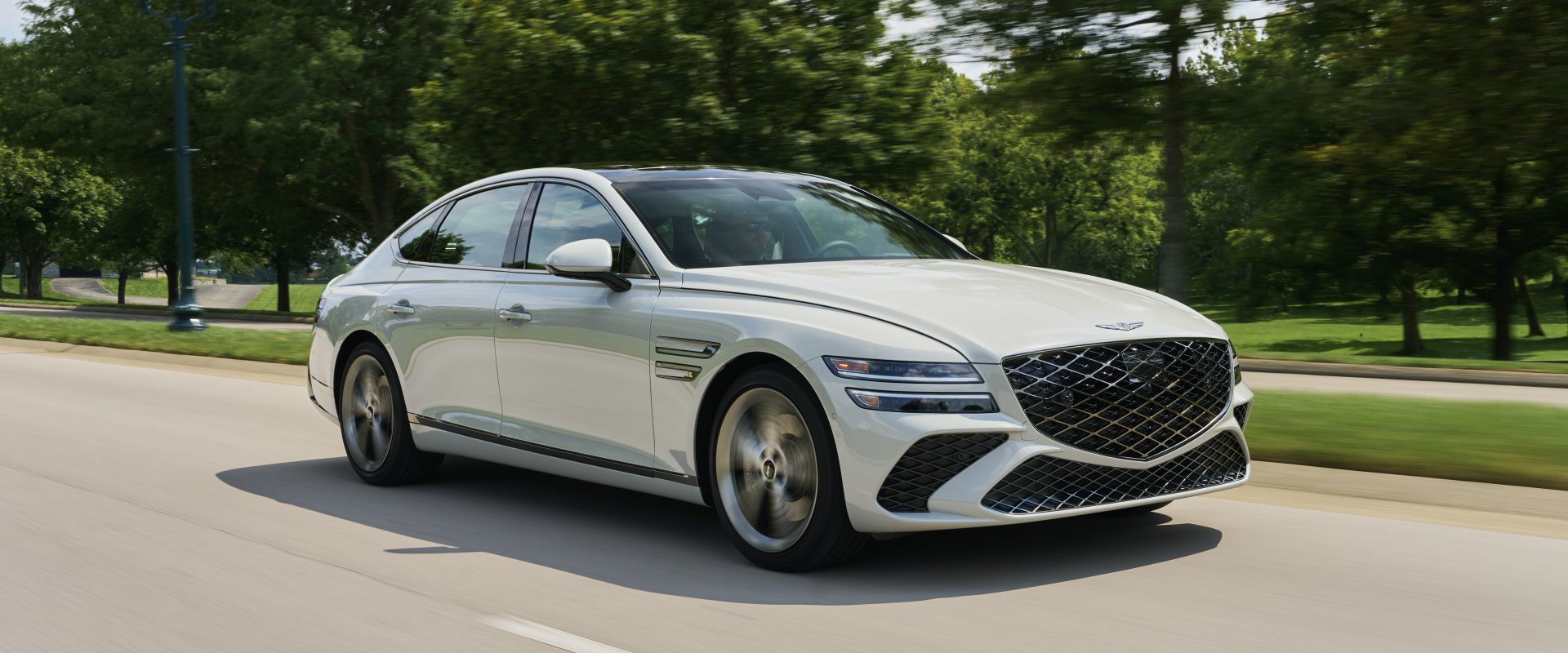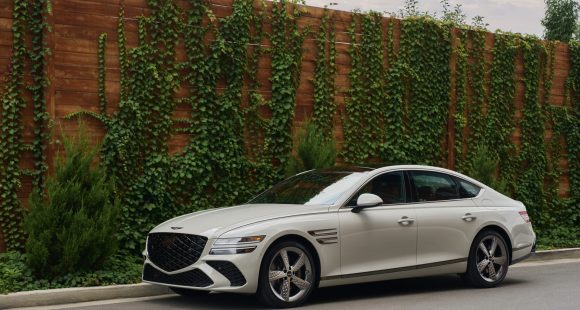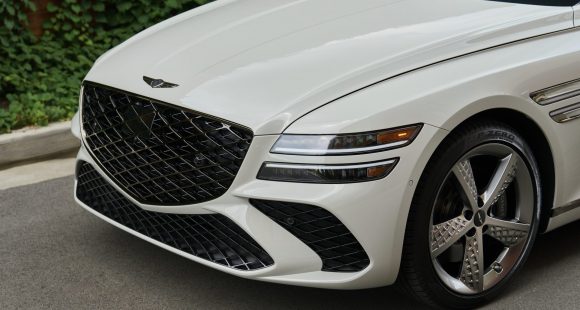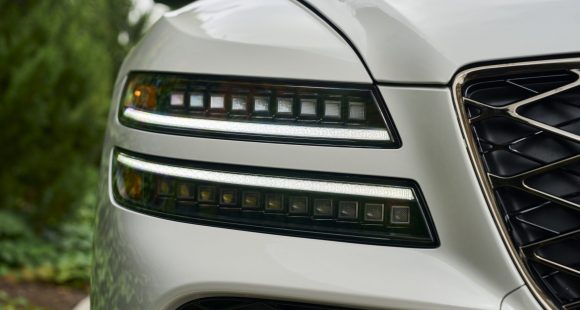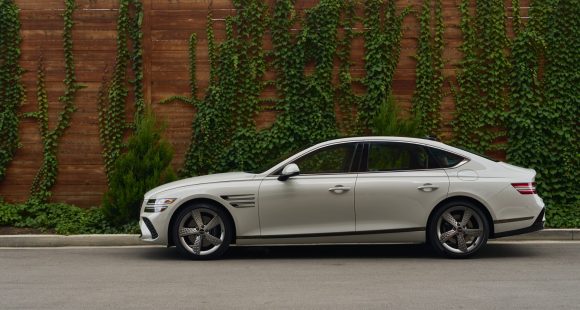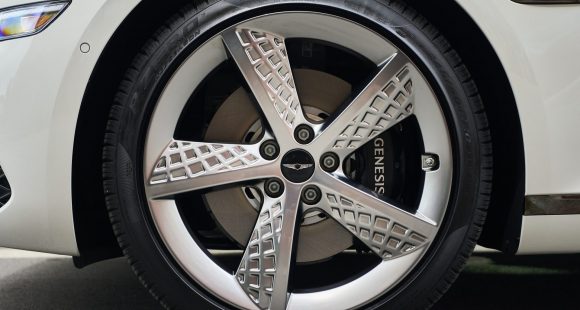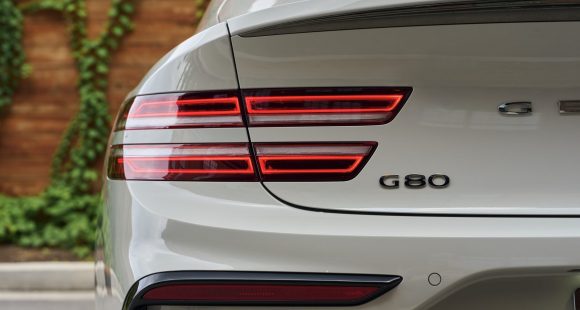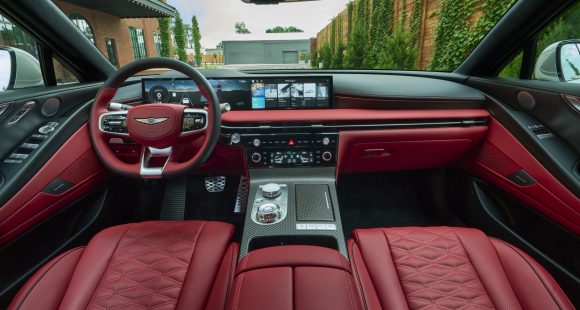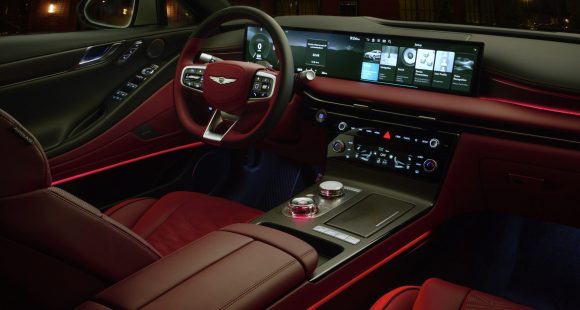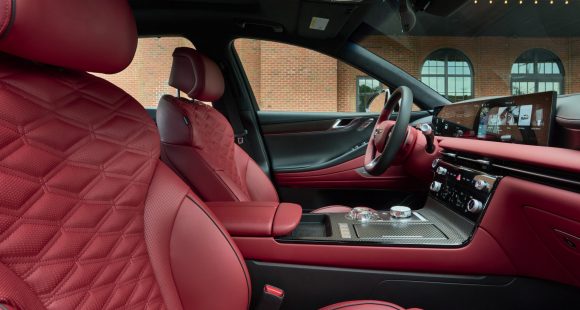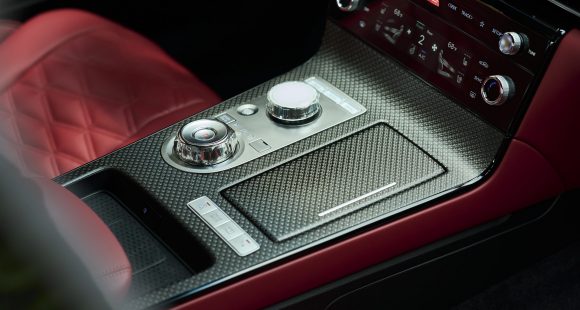2011 Hyundai Equus
Hyundai’s reputation - especially as of late - is based on building affordable vehicles with great value and quality. But now the Korean carmaker is taking that formula to the large luxury sedan segment. This is the all-new 2011 Equus, and it will compete with flagships from Lexus, Mercedes and others. That’s an astounding goal, but has Hyundai finally bitten off a little more than they can chew?
When Hyundai introduced the Genesis premium mid-size sedan two years ago, we wondered if the value carmaker could compete in a more rarified class. We quickly concluded that it could. Now, to cement its reputation even further as a premium brand, the carmaker brings to market the full-size 2011 Hyundai Equus. As their new flagship, Equus aims to compete with vaulted saloons like the Lexus LS, and even the Mercedes-Benz S-Class. Equus will attempt to do so by delivering all the bells and whistles affluent buyers expect, but at a much more affordable price point. But, right off the bat, targeted buyers may have two reservations. One, the full-line Hyundai badge itself, and two, the car’s overly conservative styling. It looks bland even compared to its hardly earth shaking rivals. Except for a Bentley-like rear end, there isn’t much to attract an exclusive eye to the Equus. Still, the big sedan does exude sophistication with a Genesis-like front fascia and a flowing greenhouse and roofline for an almost presidential profile.
But there’s also a hint of sportiness here, thanks to brawny rear shoulders, 19-inch chrome alloys, and dual exhausts. Things improved when we stepped inside its executive cabin. It’s spacious, with well laid out controls amid nicely done wood trim. But there’s still an air of cost containment, from the plain gauges, to an abundance of hard plastics, to even the unremarkable face of the analog clock. On the other hand, a lot that’s optional on rivals is standard on Equus.
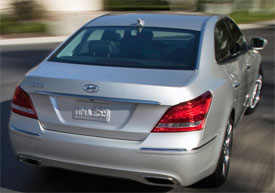 Base Signature trim includes front seats that are very comfortable and supportive, with heat, ventilation, and even driver’s side massage. A class first. Likewise, there’s heat for the wood and leather-wrapped steering wheel. Other standard luxuries include dual automatic climate, navigation, back-up camera and a 17-speaker Lexicon stereo. And get this, an Apple iPad owner’s manual! Comfort extends to the enormous rear seats with sunshades and the only
Base Signature trim includes front seats that are very comfortable and supportive, with heat, ventilation, and even driver’s side massage. A class first. Likewise, there’s heat for the wood and leather-wrapped steering wheel. Other standard luxuries include dual automatic climate, navigation, back-up camera and a 17-speaker Lexicon stereo. And get this, an Apple iPad owner’s manual! Comfort extends to the enormous rear seats with sunshades and the only
standard power recliners in its class. A three passenger heated split bench is standard, with Ultimate Trim dividing it into two individual seats, and adding massage, a console refrigerator, and DVD system.
All seats fold, adding nicely to the Equus’ generous 16.7 cubic foot trunk space. Based on the Genesis sedan platform, the Equus is powered by the same 4.6-liter variable-timing V8, good here for 385 horsepower and 333 pound-feet of torque. Power moves to the rear wheels through a six-speed automatic with manual shift mode. On the track, our Equus charged from 0 to 60 in a fast 6.1 seconds, and cleared the quarter mile in 14.6 seconds at 99 miles per hour. Equus feels powerful off the line, but not overwhelmingly so. Power delivery builds nicely, and is quite smooth. Shifts, too, were smooth, but a little slow. Driving dynamics are governed by front and rear multilink geometries. And the electronically-controlled air suspension with Continuous Damping Control includes height-adjustable and driver-selectable Sport mode. And through the cones, with Sport mode on, the Equus feels acceptably capable, and trimmer than it actually is.
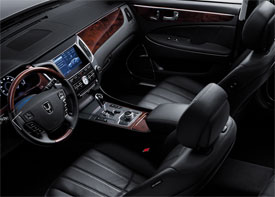 Understeer is always present, as is a fair amount of body roll. The steering is light and linear, but with little feedback. We give it better overall marks than the Lexus LS, but it doesn’t come close to the caliber of a German sedan. Equus stopping power is solid. With large vented discs at all four corners, the 4,500-pound Equus managed 60 to 0 in a good 127 feet. So, while overall, Equus performance seems unremarkable, as a first effort, it’s still very notable. On public roads, the Equus is more than competent. It’s very quiet and smooth, maybe a little too smooth. There are no ragged edges about this car’s performance.
Understeer is always present, as is a fair amount of body roll. The steering is light and linear, but with little feedback. We give it better overall marks than the Lexus LS, but it doesn’t come close to the caliber of a German sedan. Equus stopping power is solid. With large vented discs at all four corners, the 4,500-pound Equus managed 60 to 0 in a good 127 feet. So, while overall, Equus performance seems unremarkable, as a first effort, it’s still very notable. On public roads, the Equus is more than competent. It’s very quiet and smooth, maybe a little too smooth. There are no ragged edges about this car’s performance.
But then there isn’t much to get excited about either. Government Fuel Economy ratings for the Equus are 16 city/24 highway on premium gas. We achieved 21.6 miles per gallon in real world driving. The Energy Impact Score is a fairly high 18 barrels of oil consumed per year. The Carbon Footprint measures a similar 9.8 annual tons of CO2 emitted.
But here’s the kicker…the Equus Signature starts at $58,000. That’s about $8,000 less than an LS, and $30-grand less than the cheapest S-Class. The Hyundai Equus Ultimate stickers for $64,500. The 2011 Hyundai Equus is an ambitious effort, and it’s a bargain. Still, for clientele to whom status and prestige are just as important as the accouterments, the biggest hurdle for Hyundai may be the brand itself. However, we can easily see other buyers viewing the Equus as a way to play big without breaking their 401(k). And even if this Equus isn’t a hit at the country club, Hyundai has the patience to make sure the next one will be.
Specifications
- Engine: 4.6-Liter Variable-timing V8
- Horsepower: 385
- Torque: 333 Lb Feet
- 0-60 MPH: 6.1 Seconds
- 1/4 Mile: 14.6 Seconds @ 99 MPH
- 60-0 MPH: 127 Feet
- EPA: 16 MPG City/ 24 MPG Highway
- Mixed Loop: 21.6 MPG
- Energy Impact 18.0 Barrels Oil/Yr:
- CO2 Emissions: 9.8 Tons/Yr
2025 Genesis G80
New Interior And New Tech Elevates G80 Sedan
Talk about bad timing. This second-generation G80 debuted at the height of a global pandemic. But that hasn’t stopped Genesis or this Bentley-on-a-budget sedan. In fact, since then, Genesis has unveiled a spectacular all-electric version and now given all G80s a makeover. So, let’s find out what a better and better-timed new G80 is ready to deliver.
Breaking into the luxury sedan scene requires going up against traditional brands with long pedigrees and legions of loyal buyers. But Hyundai has never shied away from a challenge, and has made steady progress with their Genesis brand, and hopes that a revised 2025 G80 midsize sedan will be their next step up.
Styling matters more when you’re the upstart, and the Genesis Athletic Elegance theme changes very little for ’25; just a new grille, slightly reshaped bumpers, new wheels ranging from 18 to 20 inches, and an updated color palette. The G80’s unique two-line LED headlamps get revised Micro Lens Array technology that boosts performance while minimizing the brightness for oncoming drivers.
Changes inside are much more significant with an entirely new dash and console, eliminating both the hooded gauge panel and dashtop wide info screen. Merging them together into one 27-inch wide LG panoramic display than runs from behind the steering wheel to over the center stack. There’s a bigger and more comprehensive control panel in the center stack; while the console gets less armrest coverage, more space for storage, and reshaped cupholders. The wider display is still a touchscreen, but there is also a console mounted controller if you prefer to keep it fingerprint free. Both options work well, but the controller is still too easy to confuse with the dial-like shifter.
Materials are on par if not a notch above most European luxury rivals, and there are 18 speakers to crank out 1,400 watts of premium sound from Bang & Olufsen. Top Sport Prestige trim comes with Nappa leather seats, carbon fiber trim, micro-suede materials for the headliner and pillar covers, heated armrests, head-up display, and upgraded active safety features. Front seats are immensely comfortable without feeling overly soft, and there’s plenty of comfort and room for adults in the back seat.
More Bentley than Benz; streaking down the track with European-style solidity that gives you very little indication of the high speed you’re traveling at.
Same powertrains as last year. Base power comes from a 300-horsepower 2.5-liter turbo-four; the upgrade is this 3.5-liter twin-turbo V6 that outputs 375 horsepower and 391 lb-ft of torque. Both are hitched to standard all-wheel drive. At our Mason Dixon Dragway test track, the AWD delivered enough grip for consistent slip-free launches. We hit 60 in 5.0 seconds flat. Run after run, the 3.5T pulled as strong as it sounds. All G80s work with the same paddle-shift eight-speed automatic transmission, and while shifting was silky smooth on the street, here on the track with Sport Mode and wide-open throttle they were noticeably firmer and quicker.
It was a very surreal experience in the cabin. More Bentley than Benz; streaking down the track with European-style solidity that gives you very little indication of the high speed you’re traveling at. For us, that was 105 mph in 13.4 seconds at the quarter. In addition to the G80’s Sport Mode that tightens steering, improves throttle response, adjusts shifting points, firms up the suspension, and reconfigures stability system parameters; Sport Prestige trim adds rear-wheel steering and an electronic limited slip differential. But, even with all of that, it didn’t feel overly sporty in our handling course. Now, we were able to comfortably carry quite a bit of speed through the cones, but there was just an overall soft, somewhat disconnected and heavy presence that had us unsure of how hard we could push. Sport Prestige also adds upgraded performance brakes. They were plenty capable, bringing this 4,600-lbs. luxury liner consistently down from 60 in just 104 feet with little fade.
Government Fuel Economy Ratings for the six-cylinder are 16 City, 24 Highway, and 19 Combined. We averaged a good 21.3 mpg of Premium. Still, that’s a slightly below average Energy Impact Score, using 15.7 barrels of oil annually with 7.8 tons of CO2 emissions.
Considering the amount of luxury packed into the G80, its $58,350 starting price, even though slightly higher than last year, remains pretty remarkable. It’s a substantial step up to the 3.5T though, as it begins at $70,850.
Genesis has existed as a standalone luxury brand for just less than a decade, and it has indeed been making steady progress into what is surely the hardest segment of all to master. The 2025 Genesis G80 sedan continues to impress and is a great option for luxury-minded buyers who prioritize true value over badges.
Specifications
As Tested
- Engine: 3.5-liter twin-turbo V6
- Transmission: eight-speed automatic
- Horsepower: 375
- Torque: 391 lb-ft
- EPA: 16 City | 24 Highway | 19 Combined
- 0-60 mph: 5.0 seconds
- 1/4 Mile: 13.4 seconds at 105 mph
- Braking, 60-0 (avg.): 104 feet
- MW Fuel Economy: 21.3 mpg (Premium)







